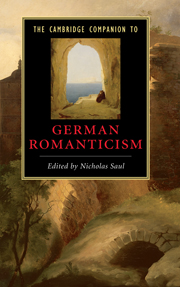Book contents
- Frontmatter
- 1 What is Romanticism, and where did it come from?
- 2 From early to late Romanticism
- 3 Prose fiction of the German Romantics
- 4 The Romantic lyric
- 5 The Romantic drama
- 6 Forms and objectives of Romantic criticism
- 7 Romanticism and Classicism
- 8 Women writers and Romanticism
- 9 The Romantics and other cultures
- 10 Love, death and Liebestod in German Romanticism
- 11 Romantic philosophy and religion
- 12 Romantic politics and society
- 13 Romantic science and psychology
- 14 German Romantic painters
- 15 Romanticism and music
- 16 Transformations of German Romanticism 1830-2000
- Key authors and their works
- Further reading
- Index
13 - Romantic science and psychology
Published online by Cambridge University Press: 28 September 2010
- Frontmatter
- 1 What is Romanticism, and where did it come from?
- 2 From early to late Romanticism
- 3 Prose fiction of the German Romantics
- 4 The Romantic lyric
- 5 The Romantic drama
- 6 Forms and objectives of Romantic criticism
- 7 Romanticism and Classicism
- 8 Women writers and Romanticism
- 9 The Romantics and other cultures
- 10 Love, death and Liebestod in German Romanticism
- 11 Romantic philosophy and religion
- 12 Romantic politics and society
- 13 Romantic science and psychology
- 14 German Romantic painters
- 15 Romanticism and music
- 16 Transformations of German Romanticism 1830-2000
- Key authors and their works
- Further reading
- Index
Summary
Romantic science and psychology are an integral and essential part of the great Romantic project towards a new synthesis, and, as such, they are intimately linked to other central aspects of German Romanticism such as art and philosophy. Indeed the conviction that only a synthetic perspective, encompassing all human abilities and attributes, could lead to an adequate understanding of nature, is a central tenet of Romantic science. The Romantics saw the methodological restrictions which characterise positivistic modern science as a dangerous reductionism. In their view this dissecting, mechanical approach treated nature's manifestations as dead objects without any meaning, destroying the integrity of nature and reducing it to the status of 'a ruin'. Against such fragmented knowledge, they provocatively posited a unifying perspective on nature, achievable only through a higher synthesis of exact knowledge and speculation, scientific experiment and intuition or, ultimately, science and art. Overall Romantic science is a highly ambitious attempt to counter some of the defining features of modernity that evolved during the Scientific Revolution of the seventeenth century and the Enlightenment of the eighteenth century and culminated in the saddle epoch around 1800; a threshold period that straddled old and new, the Ancien Régime and the modern world. Romantic science sought to offer an alternative to three underlying trends.
- Type
- Chapter
- Information
- The Cambridge Companion to German Romanticism , pp. 209 - 226Publisher: Cambridge University PressPrint publication year: 2009
- 2
- Cited by



